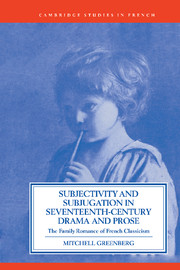 Subjectivity and Subjugation in Seventeenth-Century Drama and Prose
Subjectivity and Subjugation in Seventeenth-Century Drama and Prose Published online by Cambridge University Press: 16 October 2009
Voir ouvre tout l'espace au désir, mais voir ne suffit pas au désir.
(J. Starobinski, L'Œil vivant, p. 13)She had lived quietly with her old mother, of whom she was the sole support.
(Freud, “A Case of Paranoia,” St. Ed. 14, p.263)The Princesse de Clèves is, I would suggest, the most theoretical text of the French seventeenth century. I am here using “theoretical” advisedly, and with less coyness than may at first appear. Across its origin, “theory” leads us back to a vision, to a sighting of the world arranged for the eye, for the appetency of the eye, as a “scene”, a “tableau.” With its source in thea, the Greek root meaning “look”, “see,” it intersects with “theater” as that space which is presented to the eye, given to vision, as a production, as an arrangement that transcends the indifferent heterogeneity of the world in an image of (created) order, a theatrum mundi. Nevertheless, the chiasmatic juncture, the imbroglio of theory and theater, their inseparable origin in/as a vision, reminds us that there is never any simple division possible between the “intellectual” scaffolding of a metaphysical vision and the merely physical ocularity, framing the way we see the world in its supposedly objective reality. Both exist in collusion, the inextricable conjunction of illusion with reality, being with seeming, exterior reality with interior reality.
To save this book to your Kindle, first ensure [email protected] is added to your Approved Personal Document E-mail List under your Personal Document Settings on the Manage Your Content and Devices page of your Amazon account. Then enter the ‘name’ part of your Kindle email address below. Find out more about saving to your Kindle.
Note you can select to save to either the @free.kindle.com or @kindle.com variations. ‘@free.kindle.com’ emails are free but can only be saved to your device when it is connected to wi-fi. ‘@kindle.com’ emails can be delivered even when you are not connected to wi-fi, but note that service fees apply.
Find out more about the Kindle Personal Document Service.
To save content items to your account, please confirm that you agree to abide by our usage policies. If this is the first time you use this feature, you will be asked to authorise Cambridge Core to connect with your account. Find out more about saving content to Dropbox.
To save content items to your account, please confirm that you agree to abide by our usage policies. If this is the first time you use this feature, you will be asked to authorise Cambridge Core to connect with your account. Find out more about saving content to Google Drive.